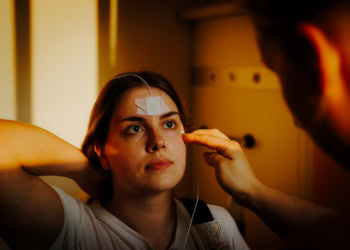First semester: Imagery, Photo, Image and Media History, Research, Photographic Techniques and Digital Image Processing 1, Basics in Layout, Typography, Visual Storytelling
BFO-121 Techniques and methods I
Imagery
Duration: 1 semester
Type (compulsory, elective): Compulsory
ECTS credits: 6
Lectures, self-study
Forms of examination: Design, presentation, term paper
Counting: 1
Teaching and learning methods: Design
Responsible: Prof. Dr. Karen Fromm
Courses
BFO-121-01 Imagery
ECTS credits: 6
Prof. Dr. Fromm
BFO-121-02 Bildsprache (German)
ECTS credits: 6
Prof. Bauernschmitt, Prof. Trippel
Qualification Objectives: The course aims at ‘learning to read pictures’. How do photographs work? What are the special qualities that determine how a photograph looks? How do you use figurative language to achieve certain effects? The qualification goal is the independent, basic mastery of design criteria in a frame (photo) to achieve expressive content as well as the transmission of emotionality. Students will have basic knowledge of visual storytelling. Initial competencies in image design emerge. Narrative stylistic devices are used deliberately. The aesthetic and content aspects of a story are combined. Students can acquire and apply basic criteria of image analysis and image criticism.
Course Content: Studies of visual languages using examples of images on the form (framing), light, light quality, light colour, colour, B&W, choice of lens, point of view, and point of focus. The course is divided into a theoretical and a practical part. In the theoretical part, the above-mentioned points will be explained using picture examples and analysed together. In the practical part, the effects of visual narrative forms are tested based on concrete practical tasks. The photographs in the practical part are to be made according to specific criteria agreed upon with the students.
BFO-131 Theory I
Photo, Image and Media History, Research
Duration: 1 semester
Type (compulsory, elective): Compulsory
ECTS points: 6
Lectures, self-study
Forms of examination: Design, presentation, term paper
Counting: 1
Teaching and learning methods: W, Ü, PA
Responsible: Prof. Dr. Karen Fromm
Courses
BFO-131-01 Photo, Image and Media History
ECTS credits: 3
Prof. Dr. Karen Fromm
BFO-131-02 Foto- und Bildgeschichte (German)
ECTS credits: 3
Prof. Dr. Karen Fromm
BFO-131-03 Research
ECTS credits: 3
Fisher/external lecturer
BFO-131-04 Recherche (German)
ECTS credits: 3
Fisher/external lecturer
Qualification goals: Students will be enabled to place their own practical activities in a broader cultural, media and historical context. They learn to locate themselves and their own work in a culture of the visual. They are familiar with important currents, tendencies, genres and formats in the history of photography and images. Students will have basic knowledge of journalistic research.
Course content: The course provides an overview of the history of photography, as well as important trends in the history of images and media. In addition to an overview of the history of photography, the history of photojournalism and developments in documentary photography receive special attention. Starting with the history of photography, the course places it in the context of the history of images and media. The seminar provides an overview of various techniques of research, which are practised through practical exercises in the seminar.
BFO-122 Qualification I
Photographic Techniques and Digital Image Processing 1, Basics in Layout, Typography
Duration: 1 semester
Type (compulsory, elective): Compulsory
ECTS points: 6
Lectures, self-study
Forms of Examination: PA
Counting: 1
Teaching and learning methods: W, design
Responsible: Raimund Zakowski / LA
Courses
BFO-122-01 Photographic Techniques and Digital Image Processing 1
ECTS credits: 3
Raimund Zakowski
BFO-122-02 Studiopraxis/Fototechnik/Bildbearbeitung (German)
ECTS credits: 3
Raimund Zakowski
BFO-122-03 Basics in Layout, Typography
ECTS credits: 3
Raimund Zakowski/LA
BFO-122-04 Grundl. Layout, Typografie (German)
ECTS credits: 3
LA
Qualification Objectives: Students will learn the basics of photographic shooting techniques in the studio, as well as the fundamentals of digital image processing.
Course content: Exercises in using camera systems and light shapers in the studio and outdoors. Implementing smaller practical photographic tasks based on concrete specifications. Introduction to the relevant image editing programs. Concrete exercises in image processing based on your own photographs.
BFO-123 Project I
Visual Storytelling
Duration: 1 semester
Type (compulsory, elective): Compulsory
ECTS points: 12
Lectures, self-study
Forms of examination: Design, presentation, term paper
Counting: 1
Teaching and learning methods: Design
Responsible: Prof. Lars Bauernschmitt
Courses
BFO-123-01 Visual Storytelling
ECTS credits: 12
Prof. Bangert
BFO-123-01 Visual Storytelling (German)
ECTS credits: 12
Prof. Lars Bauernschmitt
Qualification Objectives: Through hands-on assignments, students in this seminar will learn basic narrative techniques for developing a photographic narrative. Linear narrative techniques, nonlinear narrative techniques, classical and contemporary narrative techniques, and application of visual languages in a photographic narrative. Students grasp the scope of visual storytelling and develop short reports or image sequences in practical assignments. You will learn to edit intuition, framing, and narrative techniques into image sequences.
Teaching content: Short practical tasks are used to teach storytelling with pictures. Different narrative strategies and media implementations in photography and moving images are presented. Playful acquisition of traditional and contemporary storytelling techniques through set tasks. Sharing about the impact of the narratives developed. The different visual mediation of content is addressed in reportage, essay and series. Dramaturgy, stylistic confidence, completeness, and the entry and exit of a story will be discussed using examples and students’ work. Basic journalistic principles are applied to visual narrative forms and set in relation to each other.
In the study guide, you will find details about the individual seminars. Click on the semester you want to look at.
Your contact partners will be happy to assist you with your personal concerns. However, due to the large number of enquiries, we ask you to first check our FAQ to see if your question may already have been answered.
Dean of Studies, Design and Media department
Programme representative
Application and admission procedure
Hochschule Hannover
Faculty III – Media, Information and Design
Expo Plaza 2
D-30539 Hanover






